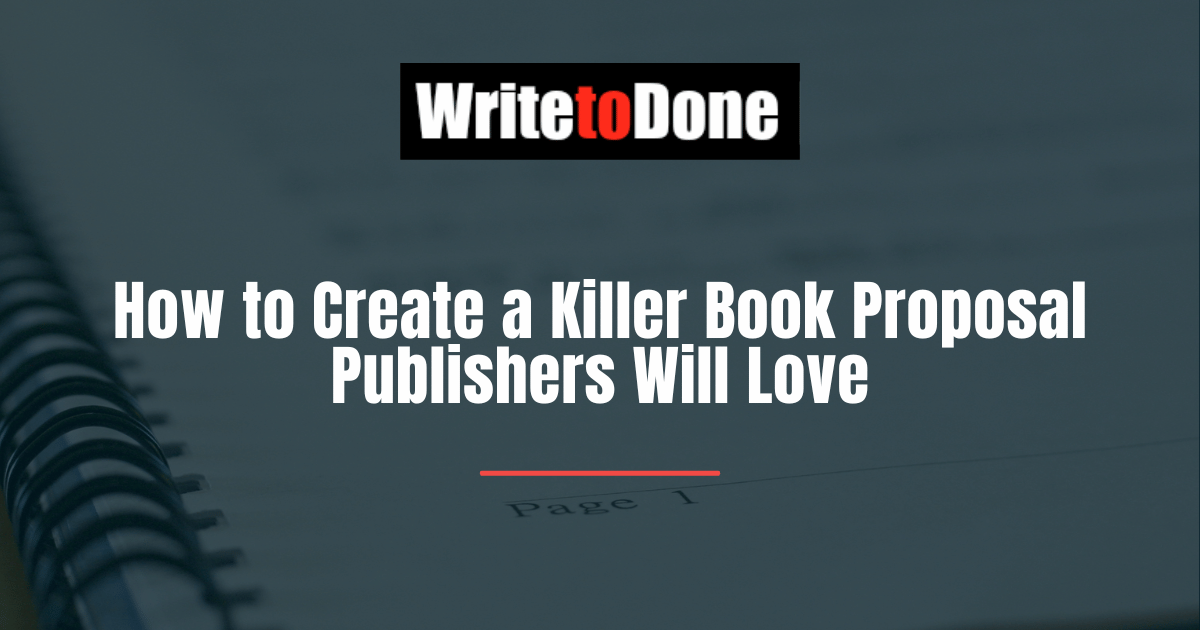Do you want a publishing deal?
But the idea of approaching a publisher fills you with dread?
Then read on to find out how to create a book proposal that will have editors falling over themselves to accept your book…
The process of writing a book proposal isn’t a 30-second sprint — it’s a marathon that requires patience and a ton of preparation. You wouldn’t start gardening without knowing which flowers you’re going to plant, would you?
Similarly, it would be a mistake to start writing a book proposal before realizing what points you need to make.
So what must a book proposal accomplish? Developmental editor and agent Fran Lebowitz says that a successful proposal addresses:
1. What is great about the idea,
2. Why are you the best person to write it,
3. Who is going to buy it, and
4. How you are going to convey the message.
In order to produce a convincing book proposal that sways a publisher’s mind, then, you need to be able to confidently tackle those points. Specifically, you must first be familiar with the market and any existing gaps in the field, which is when the actual research becomes key.
Here are the research steps you should take to create a successful book proposal.
Step 1. Research the competitive landscape.
Writing your book proposal in a vacuum is one of the biggest mistakes that you can make. That’s because you are then ignoring the Golden Egg of every proposal: that the existing market needs your book.
“In industry parlance, this is called ‘evidence of need,’” says developmental editor Katharine Sands. “What is your unique premise? What are you setting out to prove, examine, share or explore? What specific and distinct features distinguish your book from all others on the subject? This is what agents and acquisitions editors want to know.”
The bookstore is one of the best places to start researching the competitive landscape. What books would sit next to yours on the shelf? Then look online. Amazon.com has a great feature that’s called “Frequently Bought Together With” that can point you towards more comparable books.
For every competing title, be sure to note down what makes your book different — whether that be in terms of perspective, content, or quality.
Step 2. Research the target audience.
However cool your book idea is, a publisher’s going to be reluctant to take it on if it doesn’t sell. To make money, a book simply must have a target audience.
Now, a word of caution: the target audience should never be ‘everyone.’ To a publisher, that translates into the sort of blanket statement that implies that you have no target audience. Gently put, that’s not exactly the best impression that you want to impress upon a publisher.
Instead, developmental editor Patrick Price urges you to think as a marketer. Ask:
- What’s the target market?
- Women? Men?
- Age?
- People who liked [insert book here]?
- Whose needs do you meet?
Show that there is a market out there that is likely to care enough about your book to buy it.
Step 3. Build your platform.
So you’ve identified your target audience? Terrific. Now how can you reach them?
Here’s where you should put some thought into your platform. An author platform is key to the success of a nonfiction author. A strong platform:
- Gives you access to people who will read your book.
- Establishes you as an authority figure in the field.
- Shows publishers that you are a leader with proven reach in your subject area.
But it doesn’t just materialize with the snap of the finger, so if you don’t have one yet, start building it now.
Refer to the target market that you identified in the previous step. These should be the people who are most likely to read your book. Think about where these folks can be found — what they frequent on the Internet, what they do in their free time, or what else they read.
From there, you can build a list of ways that you can reach them. This might take the form of anything from speaking engagements to your online presence.
In this era of interconnectivity, a sturdy author platform is definitely a ‘must-have’ if you’d like a publisher to take you seriously. Don’t think of it as a popularity contest, but rather as a way to better communicate with your readers.
[thrive_text_block color=”blue” headline=]Special Offer for Write to Done Readers- 50% 0ff Your Brand Is Calling [/thrive_text_block]
Step 4. Research publishers.
When you’re researching publishers, the most important thing you must remember is that you must follow the publisher’s guidelines to the letter.
Does the publisher ask for your book’s projected length? Provide that. Does the publisher want to see some sort of marketing plan from you? Write down the promotion that you’d be able to undertake, given your resources.
Most of all, make sure that you’re finding publishers who publish books in your market. It makes it that much easier to then personalize your proposal to their submission requirements.
It is possible to pitch your book proposal to some publishers without finding an agent first. However, you’ll find that small and medium publishers are the ones who are most amenable to receiving unsolicited proposals. Major trade publishers are less likely to give your proposal much thought if it doesn’t come attached with an agent.
Create Your Killer Book Proposal
So what are you waiting for? Now that you have an idea of the research that builds a proposal from behind, it’s time to do the deed and carry out a book proposal that gets results! Let Zora Neale Hurston’s words guide you as you commence the research for your proposal:
“Research is formalized curiosity. It is poking and prying with a purpose.”
Do you have any tips for creating a killer book proposal? let us know in the comments below.
















